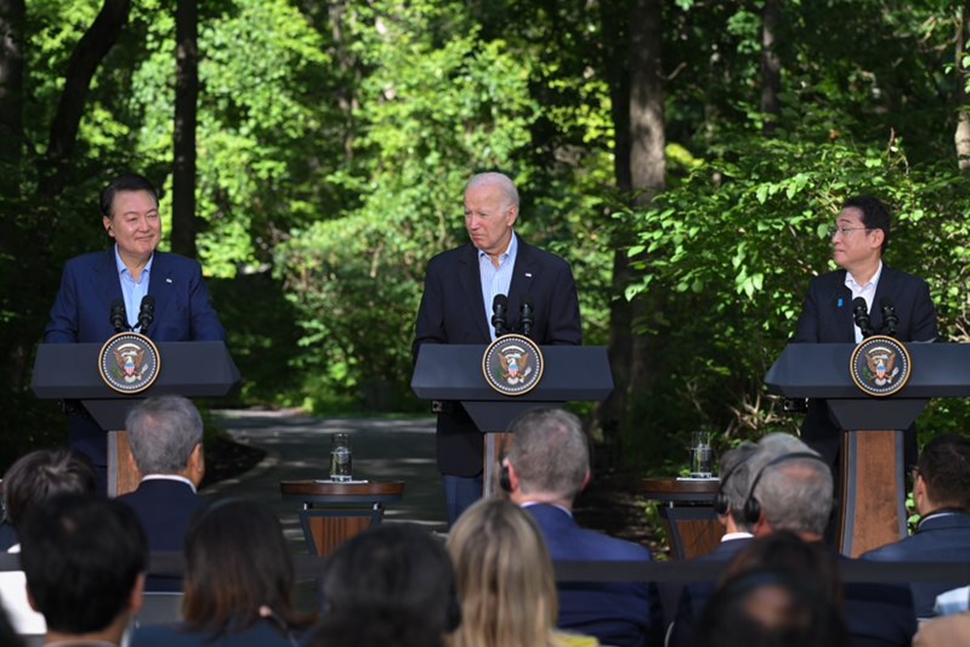[EXTRA] Year 2023 draws dynamic arc for Korea
Date Dec 21, 2023
 President Yoon Suk Yeol takes reporters’ questions as U.S. President Joe Biden and Japanese Prime Minister Fumio Kishida listen during a joint press conference after their trilateral summit at Camp David, the U.S. presidential retreat, in Maryland, August 18. (Courtesy of the Office of the President)
President Yoon Suk Yeol takes reporters’ questions as U.S. President Joe Biden and Japanese Prime Minister Fumio Kishida listen during a joint press conference after their trilateral summit at Camp David, the U.S. presidential retreat, in Maryland, August 18. (Courtesy of the Office of the President)
The year 2023 progressed in a dynamic arc for Korea. The government officially downgraded COVID-19’s health risk to that of an endemic on June 1. With life returning to what we know as normal, the Yoon Suk Yeol administration pursued the aggressive goal of strengthening the traditional alliance between the Republic of Korea and the United States. The year also saw the 70th anniversary of the armistice that ended the 1950-1953 Korean War and the signing of the ROK-U.S. Mutual Defense Treaty (October 1, 1953). President Yoon also warmed relations with Japan. All in all, the administration stressed reaffirming the value of its traditional alliance with the United States as well as cooperating with neighbors and other countries.
The president's hard diplomacy drive was exceptionally noteworthy when he met with U.S. President Joe Biden in Seoul just 11 days after taking office in 2022. Then in April 2023, President Yoon traveled to Washington D.C. to mark the 70th anniversary of the ROK-U.S. alliance. From that meeting emerged the Washington Declaration, a joint statement with President Biden, detailing plans for a stronger joint extended deterrence against North Korean nuclear and missile threats. The two leaders also agreed to establish the Nuclear Consultative Group to share extended deterrence-related information on joint planning and implementation.
Then, on August 18, 2023, President Yoon took part in the historic Camp David Summit held with U.S. President Biden and Japanese Prime Minister Fumio Kishida. In an article in the August edition of “Korea Here & Now,” we described how the “Camp David Summit reshapes Korea-U.S.-Japan ties.” At the summit, President Yoon noted, “From this moment on, Camp David will be remembered as a historic place where the Republic of Korea, the United States and Japan proclaimed that we will bolster the rules-based international order and play key roles to enhance regional security and prosperity based on our shared values of freedom, human rights and the rule of law.” The Camp David Summit produced three agreements – the Spirit of Camp David, the Camp David Principles and the Commitment to Consult.
Meanwhile, in Korea, various ceremonies were held to commemorate the Korean War and the nations that rendered support. The Ministry of Patriots and Veterans Affairs (MPVA) held its “Turn Toward Busan” ceremony in November to honor fallen U.N. Korean War veterans. The cemetery in Busan is the resting place for some 2,300 troops from 11 countries, including Australia, Canada, France, the Netherlands, New Zealand, Norway and Turkey (now Türkiye), as noted in the “Korea Here & Now” November edition. During the Korean War, 40,670 service members from 22 U.N. nations were killed, 104,280 were wounded and 4,116 are still listed as missing. The veterans’ ministry also supports organizations such as the New York-based Korean War Legacy Foundation which works to remember the veterans of the Korean War, as covered in the August edition of “Korea Here & Now.”
In a more light-hearted vein, the panda Fubao, the cub of the Panda couple that was a state gift from Chinese President Xi Jinping in 2016, delighted and still delights Koreans from her home in Zootopia at Everland, south of Seoul.
Also, Korean content flourished like never before. If a "K" in front of content such as K-pop, K-dramas and K-beauty once invited sarcasm, those days are long gone as the popularity of Korean creations has soared. Grace Kao, a professor at Yale, in a May interview said that Korea should not ditch its “Korean elements” for its future. “When people are watching K-pop, they want to see Korean things," Kao stressed. “They do not want K-pop to become a pure Western product or an American thing. I think it should resist the temptation to look too Western.”
K-pop demonstrated it was continuously evolving with virtual girl groups Eternity (also known as IITERNITI) and MAVE: emerging along with virtual boy band PLAVE as seen in a story from the October edition.
Just as the world was captivated by Korean cultural content, Koreans themselves began to rediscover their roots by using distinctive perspectives. Traditional hanbok attire met K-pop when young designer Chang Ha-eun – along with her mother, a first-generation hanbok maker – designed costumes that BLACKPINK wore in their “How You Like That” video and on tour later. The traditional wrestling ssireum regained popularity as a May “Korea Here & Now” article noted. Koreans also gave modern updates to the traditional charye rites performed to give thanks for harvests and honor ancestors during the Chuseok holiday.

The Ministry of Culture, Sports and Tourism's "Korea Here & Now" work can be used under the condition of "Public Nuri Type 1 (Source Indication)."




